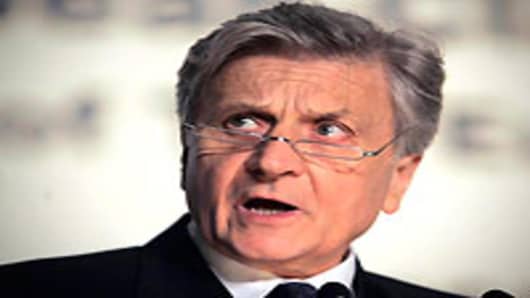ECB chief Jean-Claude Trichet discussed exchange rates with euro zone finance ministers on Monday but said nothing new on a dollar slide that some fear could hurt Europe's economic recovery.
The European Central Bank president repeated a now well-worn line that he had no reason for doubt when U.S. Treasury Secretary Timothy Geithner or Federal Reserve Chairman Ben Bernanke said a strong dollar was in U.S. interests.
"Europe, the Eurogroup and the European Central Bank would echo this position, which has been repeated recently by the American authorities," Trichet told a news conference after a meeting of the Eurogroup of euro zone finance ministers.
Trichet was flanked by Jean-Claude Juncker, who chaired the Luxembourg meeting and summed up on behalf of the ministers, saying they and the ECB had exactly the same line on the matter.
The euro's gains make exports from Europe's 16-country common currency area more expensive.
It has risen about 20 percent versus the dollar since early March and about the same amount versus the Chinese yuan, which is virtually pegged to the dollar. The euro was trading late on Monday at about $1.49, near 14-month highs against the dollar.
French Economy Minister Christine Lagarde said she was preoccupied by exchange rate levels seen for the euro.
"We reiterated together that we want and need a strong dollar," she said.
Dutch Finance Minister Wouter Bos described the meeting as "pretty boring" and stuck to the more sanguine view his country often takes on currency matters.
"We always say we believe that the strength of a currency reflects the strength of the economy, so a strong euro reflects the strength of the European economy," Bos told reporters.
Austrian Finance Minister Josef Proell told reporters the main issue for now was ensuring recovery from recession and then unwinding the government intervention deployed to shore up the economy over the past year or so.
"It's clear that in the future, in the next months, we have to have a look at the euro compared to the U.S. dollar, compared to the Chinese currency, but it's not the main focus," he said.
Exit Strategies
Juncker said new economic forecasts the European Commission, the European Union's executive body, was due to release in early November would set the scene for more meaningful discussion on the timing of a withdrawal of government stimulus.
"There are clear signs of recovery but there is still a balance between the positive sides and negative sides ... we don't think the time is right to put an end to our recovery programmes," he said.
"It seems to us monetary stimulus in the euro zone should be gradually withdrawn and we will be coming back to this in November and December."
Juncker had said last Friday on the currency question: "I'm not concerned too much by the exchange rate we are observing. But if it continues in the way it started weeks ago, I could become concerned at a certain junction. Don't ask me where that junction is located exactly.
More From CNBC.com
- Global Investing: An "Absolute Necessity"
- Black Monday: 22 Years Later
- Slideshow: Most Expensive Colleges
He confirmed that he and Trichet planned to travel to China to discuss currencies by the year-end with Joaquin Almunia, the European Union's economic affairs commissioner. The three visited China to discuss exchange rates in late 2007.
The finance ministers will reconvene on Tuesday with peers from the wider EU. The Monday session was forced to move to a castle due to milk price protests by some 2,000 farmers in tractors outside the original conference centre venue.


